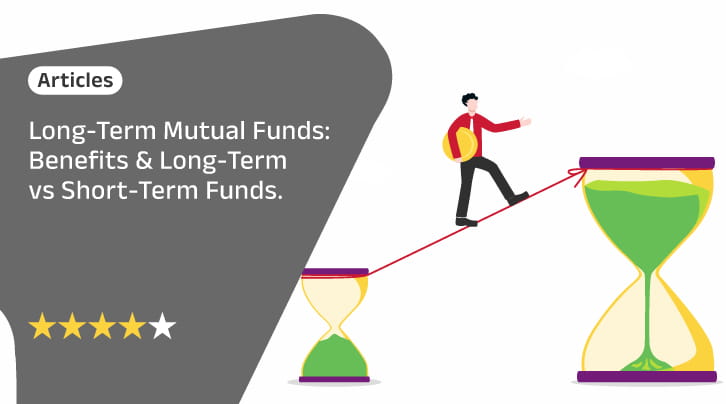-
Our Products
Our FundsFocus Funds
-
Self Care
Self-ServiceFind InformationWays To TransactPartner Solutions
-
Downloads
- Learnings
- About Us
-
More
-
Shareholders
-
Shareholders
-
-
SIP Calculators
- Back
-
Shareholders
What are Long-Term Mutual Funds?

Oct 08, 2024
5 min
4 Rating
What are Long-Term Mutual Funds?
Long-term mutual funds typically invest in equities, balanced funds, or diversified portfolios with the goal of achieving significant returns over an extended period. Investors often select between short-term and long-term mutual funds based on their financial goals, risk tolerance, and investment timelines.
Benefits of Long-Term Mutual Funds
Here are some of the key advantages of investing in long-term mutual funds:
Higher Returns Potential
Long-term mutual funds are equity-oriented and tend to provide higher inflation-beating returns over extended periods than short-term funds. Investing for a long duration allows exposure to market volatility, resulting in a superior compounding effect.
Power of Compounding
One of the greatest benefits of long-term investment is the power of compounding. Compounding refers to earning returns on returns already earned. The longer the investment period, the more pronounced the compounding effect becomes.
Rupee Cost Averaging
Long-term systematic investment plans allow rupee cost averaging, which means buying more units when prices are low and fewer units when prices are high. This averages out the purchase cost, especially during volatile markets.
Lower Expense Ratios
Long-term funds tend to have lower expense ratios compared to short-term funds. A lower expense ratio directly translates into higher net returns on investment.
Wealth Creation
Long-term mutual funds can create significant wealth over 10, 15, or even 20-year periods. They allow investors to meet crucial financial goals like retirement planning or children's education planning.
Difference Between Long Term and Short Term Mutual Funds
The main difference between long-term and short-term mutual funds lies in the investment horizons and objectives. Short-term funds aim to provide stable returns over shorter periods of 1-3 years. They invest predominantly in fixed-income securities like bonds, treasury bills, etc. These provide steady returns and are less volatile.
In contrast, long-term equity mutual funds typically have longer investment horizons of 5-10 years or more. These funds are actively invested across stocks and equity markets, aiming to provide higher inflation-adjusted returns over time. However, they carry higher volatility and risks in the short run.
How to Invest in Long-Term Mutual Funds
Investing in long-term mutual funds involves a few quick and easy steps:
Register online on the website or mobile app
Navigate to the Mutual Funds section and select the long-term equity fund you wish to invest in
Choose investment amount and periodicity - lumpsum or SIP
Provide mandatory KYC details, including PAN, bank details, etc.
Complete payment and documentation to finish investing
When to Invest in Long Term Mutual Funds?
Long-term mutual funds are ideal for investors with higher risk appetites and longer timelines willing to withstand interim volatility. Here is when long-term funds prove extremely rewarding:
Retirement Planning
Long-term mutual funds are great for retirement planning with a 15-20-year horizon when starting your career.
Child Education/Marriage
Accumulate lakhs using SIPs, which stands for Systematic Investment Plan, in these funds towards major future responsibilities of the child. SIP is a method of investing a fixed amount regularly in mutual funds, allowing investors to grow their wealth gradually through the power of compounding and rupee cost averaging
Buying House/Car
Wealth creation through long-term funds helps make big-ticket purchases like houses without loans.
Beating Inflation
Long-term funds deliver inflation-beating double-digit returns, helping money grow above rising prices.
Achieving Goals without Risk
Long run compounds wealth across market cycles, enabling the achievement of goals
Ideal Investment Horizon for Long-Term Mutual Funds
Long-term mutual funds invest primarily in equities and growth mechanisms, so they require longer time frames to realise their return potential. Based on historical equity market cycles, ideal investment horizons for long-duration mutual funds would be:
Minimum 5 years
Optimal 7-10 years
10+ years for best performance
Stay invested long-term; don't try to time the markets. This way, your investments can grow faster and beat inflation over time.
How long should You stay invested in mutual funds?
The ideal time to stay invested in mutual funds varies depending on factors like tax implications and market conditions. If you hold equity mutual fund units for less than a year, Short-Term Capital Gains (STCG) tax will apply. However, staying invested for over 12 months can qualify you for Long-Term Capital Gains (LTCG) tax, which typically has a lower rate. While a tenure of 12 to 24 months can yield favorable returns during bullish markets, long-term investments may not always guarantee high returns, especially in bearish phases, where markets can fluctuate and potentially lead to prolonged periods of losses.
The key is to assess market conditions and your financial goals when deciding the tenure.
Financial experts often suggest that the duration of an investor's time in the market should align with their investment goals. The nature of your goal determines the type of mutual funds you should consider. For instance, short-term goals, like saving for a vacation, may require temporary parking of funds, while long-term goals, such as retirement planning or children's education, demand a different investment approach.
To better understand the returns a mutual fund can yield based on its investment tenure, you can utilize tools like SIP Calculator.
Conclusion
Long-term mutual funds offer significant wealth creation potential, making them a valuable part of your portfolio. Consider your risk tolerance, set a long-term investment horizon, and invest regularly to benefit from compounding returns. Stay committed, informed, and patient for potentially significant returns.
Tax Disclaimer: The details related to tax benefits are general information only. Investors are advised that before investing, consult their Tax Consultant or Financial Advisor to determine tax benefits applicable to them.
Mutual Fund investments are subject to market risks, read all scheme related documents carefully.





 1800-270-7000
1800-270-7000



